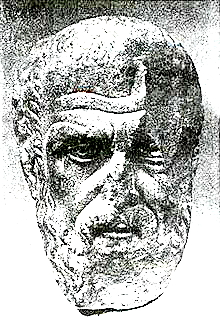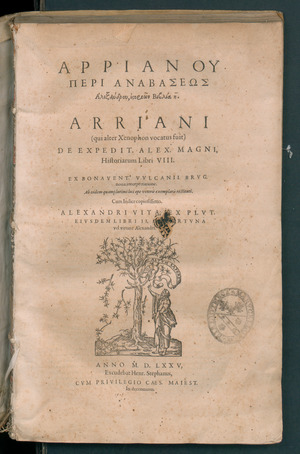Arrian facts for kids
Quick facts for kids
Arrian
|
|
|---|---|

Bust of Arrian
|
|
| Born |
Lucius Flavius Arrianus
c. 86 |
| Died | c. 160 (aged 73–74) |
| Nationality | Greek |
|
Notable work
|
The Anabasis of Alexander Indica Periplus of the Euxine Sea |
|
Influences
|
|
Arrian of Nicomedia (/ˈæriən/; Greek: Ἀρριανός Arrianos; Latin: Lucius Flavius Arrianus; c. 86/89 – c. after 146/160 AD) was a Greek historian, government official, military leader, and philosopher during the Roman period.
His book, The Anabasis of Alexander, is often seen as the best source of information about the military journeys of Alexander the Great. Experts have usually preferred Arrian's writings over other old sources.
Arrian's Life
Arrian was born in Nicomedia, which is now called İzmit in Turkey. This city was the main city of the Bithynia region. He was born around 85 to 90 AD. His full name, L. Flavius Arrianus, shows that his family had been Roman citizens for a long time. They were part of the important Greek families in the area.
His Teacher, Epictetus
Around 117 to 120 AD, Arrian studied with a famous philosopher named Epictetus in Epirus. Arrian wrote down Epictetus's lessons, which became the main way we know about Epictetus's ideas today. After studying with Epictetus, Arrian went to Athens. There, people called him the "young Xenophon." This was because his relationship with Epictetus was similar to how Xenophon had learned from Socrates.
Friend of Emperor Hadrian
Around 126 AD, Arrian became friends with the Roman emperor Hadrian. Hadrian appointed Arrian to the Senate, which was like a powerful government council. Around 130 AD, Arrian became a consul suffectus, a high-ranking official. Then, in 132 AD, he was made governor of Cappadocia, a Roman province. He served in this role for six years.
Stopping an Invasion
In 135 AD, while Arrian was governor of Cappadocia, a group called the Alani invaded nearby lands. Their leader, King Pharasmanes II of Iberia, encouraged them. Arrian's Roman legions bravely stopped their advance into Cappadocia. This showed Arrian's skill as a military commander.
Arrian thought of himself as "the second Xenophon." This was because he was highly respected and known for his great learning. This quality was called paideia (παιδεία) in Greek. It meant someone who was very educated and important.
Arrian's Writings
Arrian wrote many books, but only eight of them are still around today. His books Indica and Anabasis are the only ones that are complete.
Periplus of the Euxine Sea
This is one of Arrian's earliest works that we can be sure about the date. It was a report written for Emperor Hadrian about a journey around the Black Sea.
Discourses of Epictetus and Enchiridion of Epictetus
Arrian was a student of Epictetus around 108 AD. He wrote down Epictetus's lectures, which became known as the Discourses of Epictetus. These books are like a direct record of Epictetus's teachings.
The Enchiridion is a shorter book. It's like a summary or handbook of all of Epictetus's main philosophical ideas. It was probably a guide for Arrian himself.
Anabasis of Alexander
This important work has seven books. It tells the story of Alexander the Great's military campaigns. Arrian used another historian, Xenophon's, account of Cyrus's march as a model for his own book.
Ta met' Alexandron
This work is also called History of the Diadochi or Events after Alexander. It was originally ten books long. It tells the story of the leaders who took over after Alexander the Great died, around 323 to 319 BC. Only parts of this work still exist today.
Parthica
This was a lost work of seventeen books. It was a History of the Parthians. Arrian wrote it to describe the events of Emperor Trajan's war against the Parthians.
Bithyniaca
This work had eight books. It was about the history of Bithynia, Arrian's home region.
Indica
Indica is a book about many different things related to India. It also describes the sea journey of Nearchus in the Persian Gulf. The first part of Indica was based on the writings of Megasthenes. The second part was based on a journal kept by Nearchus during his voyage.
Techne Taktike
Written around 136 or 137 AD, Techne Taktike is a book about Roman cavalry and military strategies. It includes details about how the Roman army was organized and trained.
Kynēgetikos
Cynegeticus (Κυνηγετικός) is a book about hunting with dogs, especially a type of dog called Celtic greyhounds. Arrian wrote this book to add to an earlier work on hunting by Xenophon, whom he greatly admired.
Ektaxis kata Alanon
Ektaxis kata Alanon (Ἔκταξις κατὰ Ἀλανῶν) means Deployment against the Alani. This work is now only in fragments. It describes the battle plan Arrian used when he stopped the Alani invasion of Cappadocia in 135 AD. In this work, Arrian said that his methods of warfare were based on Greek ideas.
Other Writings
Arrian also wrote several shorter biographies, or life stories, about famous people. These included Dion of Syracuse, Timoleon of Corinth, and a bandit named Tilliborus. These works are now lost.
How We Know About Arrian
Most of what we know about Arrian's life comes from a 9th-century book called Bibliotheca by Photius. We also learn things from Arrian's own writings. Other ancient writers like Arnobius and Aulus Gellius also mentioned him. Pliny the Younger wrote several letters to Arrian.
In the 17th and 18th centuries, people began translating Arrian's works into other languages like English and French, making them available to more readers.
See also
 In Spanish: Flavio Arriano para niños
In Spanish: Flavio Arriano para niños
 | James Van Der Zee |
 | Alma Thomas |
 | Ellis Wilson |
 | Margaret Taylor-Burroughs |


